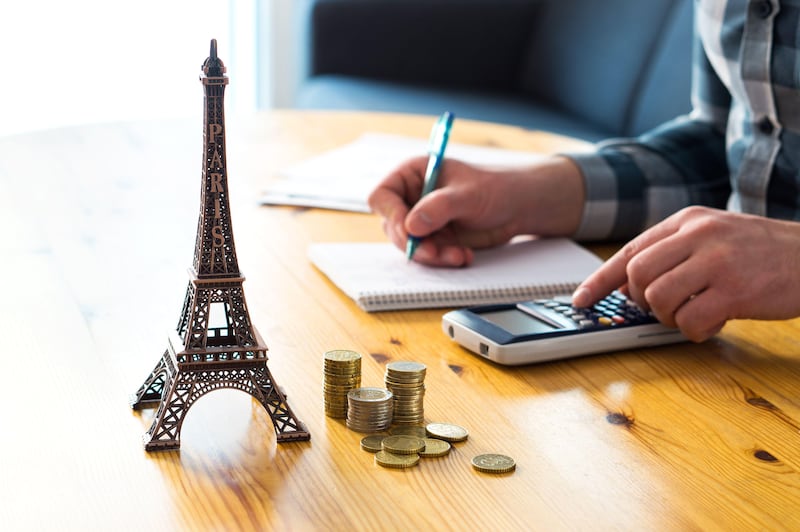For Bhumi Joshi, a marketing specialist at construction company Khansaheb Group, travelling is an investment.
A weaker currency does not always determine her travel choices, but it helps her holiday dirhams go a little farther due to favourable exchange rates.
“For example, during a recent visit to Sri Lanka, we were able to spend and stay luxuriously, compared with my previous travels to European countries like Amsterdam or Paris, where we had to keep an eye on the fluctuating euro rates and book in advance to budget the trip,” Ms Joshi says.
“Travel can sometimes be very expensive. Between flights, stay, activities and food, among other things, the cost of travel can add up pretty quickly.”

Travelling to countries with weaker currencies compared with the dirham can offer better value for UAE residents as the rising cost of living globally weighs on people’s spending habits and how they budget for holidays.
Affordability is stopping many people from going on holiday, according to a March survey of 2,461 adults by US financial services company Bankrate.
About 58 per cent of US adults who are unlikely to take a summer holiday said they can’t afford it, while 62 per cent of those who can’t afford a holiday this year attributed it to inflation or rising prices, the survey found.
Inflation is to blame as 29 per cent of likely holidaygoers plan to stay in less expensive accommodations or destinations, the results showed.
Since the UAE dirham is pegged to the US dollar, the value of the dirham against other currencies is influenced by movements in the greenback's exchange rate, says Steve Odinga, research analyst at market research provider Euromonitor International.
As a result, UAE residents may experience fluctuations in the relative affordability of travel destinations based on changes in the US dollar exchange rate against other currencies.
“Countries with weak currencies or that offer better value for dirhams are Egypt, Turkey, South Africa, India, Indonesia and Thailand,” Mr Odinga says.
“On the other hand, travelling to countries with stronger currencies compared to the UAE dirham can be more expensive for UAE residents. In such countries, the purchasing power of the dirham may be lower and expenses can be higher.
“Countries with strong currencies [expensive for UAE residents] include the US, eurozone countries, the UK, Switzerland, Japan and Australia,” he adds.

Rami Kiwan, a Lebanese-Canadian economist in the UAE, generally chooses his travel destinations based on several factors, including the experience the country has to offer (culture, cuisine and nature, among other things), its proximity, ticket prices and the destination's reputation.
The exchange rate or the general level of prices in the destination country plays only a partial role in his travel choices, but when it does, he tries to take advantage of it by staying in nice hotels or doing extravagant activities.
“Recent examples include Turkey, Thailand and Ethiopia,” Mr Kiwan says.
“A country with a stronger currency than the dirham does not dissuade me from travelling there.”
Several currencies have depreciated against the dirham, notably the Indian rupee, according to Rashed Al Ansari, chief executive of Al Ansari Exchange.
Other currencies have also exhibited significant declines in their value against the dirham when compared with the same period last year, including the Egyptian pound with a 63 per cent decrease, the Turkish lira with a 50 per cent plunge, the Pakistani rupee with a 23 per cent decline, and a modest 2 per cent drop for the Japanese yen, he says.
This trend of weaker currencies and favourable exchange rates could potentially serve as an incentive for UAE residents to travel to these countries where the purchasing power of their dirham is higher, Mr Al Ansari says.
“For the past three months, the foreign currency exchange market has witnessed a weakening trend in many currencies against the UAE dirham. These currencies include [the] Turkish lira, Georgian lari, Sri Lankan rupee, Japanese yen, Malaysian ringgit, Indonesia rupiah and Kenyan shilling, among others,” says a Lulu Exchange UAE representative.
“As these are countries already favoured by UAE residents, the weakening trend observed in these currencies against the US dollar and UAE dirham may encourage more travel as they offer better value for money.”
Any further strength in the US dollar in the near term will lead to further weakening of these currencies against the UAE dirham as well, he says.
Lulu Exchange UAE expects the weakening trend in these currencies to likely continue in the current quarter.
European countries such as Norway, Denmark, Germany, France, the UK, Switzerland, along with Singapore, Australia and Canada are considered expensive to travel to from the UAE because of their strong currencies and higher cost of living, the representative says.
“There is a huge increase in demand for travelling outside the country, and while some residents opt for countries with weaker currencies to stretch their dirhams as much as possible, we are also seeing a surge in demand for affordable packages to premium destinations with some elements of luxury travel stitched in,” says Raheesh Babu, chief operating officer of online travel agency Musafir.com.
“These countries include Armenia, Thailand, Kazakhstan, Lebanon, Sri Lanka, Indonesia, Vietnam, Azerbaijan and Tanzania.”
Major European destinations, London, the US, Australia, and certain nearby destinations like Jordan and Qatar have a relatively higher cost of touring.
The average spend per person on a travel package is Dh3,500 ($953) to Dh4,000 including flights, four-star accommodation, daily breakfast, airport transfers and some sightseeing tours or activities, according to Musafir.com data.
The average holiday package duration for these countries is four to five nights.
UAE holidaymakers can adopt a few currency strategies to optimise the value of their money during summer travel.
To achieve the most favourable rates, travellers should diligently track and identify opportune moments for currency exchange, Mr Al Ansari says.
Compare exchange rates at different exchange houses in the UAE to get the best rates when converting dirhams to the local currency of the destination country.
Selecting reputable exchange companies that offer fair rates is equally crucial in ensuring a cost-effective conversion process, he says.
Holidaymakers should also avoid airport currency exchanges, the Lulu Exchange UAE representative says.
“UAE holidaymakers may exchange money at currency exchanges or banks in the city for better deals as currency exchange counters at airports usually offer less favourable rates,” he says.
“Use prepaid travel cards that offer competitive exchange rates, which can be loaded with foreign currency in advance and can be a safer alternative to carrying large amounts of cash.”
Such cards allow users to lock in advantageous exchange rates before embarking on their journeys, enabling them to make transactions in multiple currencies, according to Mr Al Ansari.
The utilisation of such cards not only helps to minimise foreign transaction fees but also eliminates the need to carry large sums of cash, he says.
Carry a mix of cash and card since some places may accept card payments, while others may prefer cash, Mr Odinga from Euromonitor International says.
“Carry an internationally acceptable currency such as the US dollar as most destinations accept it,” says Amitabh Upadhya, president of the Sharjah branch of IDM International University, and whose academic and scholarly specialism is tourism management.
“Using credit cards is fine but get clarity from your bank about the commission for exchange. Cards are a good option for safety reasons and you earn rewards, too.”
It is also important to avoid last-minute plans. Holidaymakers will receive better value for money if they plan well in advance as airfare and accommodation prices are seasonal and time-sensitive, Mr Upadhya says.
To extract maximum yield and mitigate the low season losses, airlines and hotels use differential pricing tactics. Therefore, planning and booking early gets you a good deal, he says.
“The choice of destination will depend on time available and budget. If it is a short visit, choose a destination closer home so that you can avail good airfare from a 'no-frills airline' as they usually fly within four to five hours of flying distance to return to home base to avoid exorbitant parking charges at another airport,” he adds.
“The accommodation should be chosen based on features such as proximity to major attractions, well-connected with public transport facilities and efficient in service. Always try to get a referral and do not depend on reviews as they might have been manipulated for marketing purposes.”







